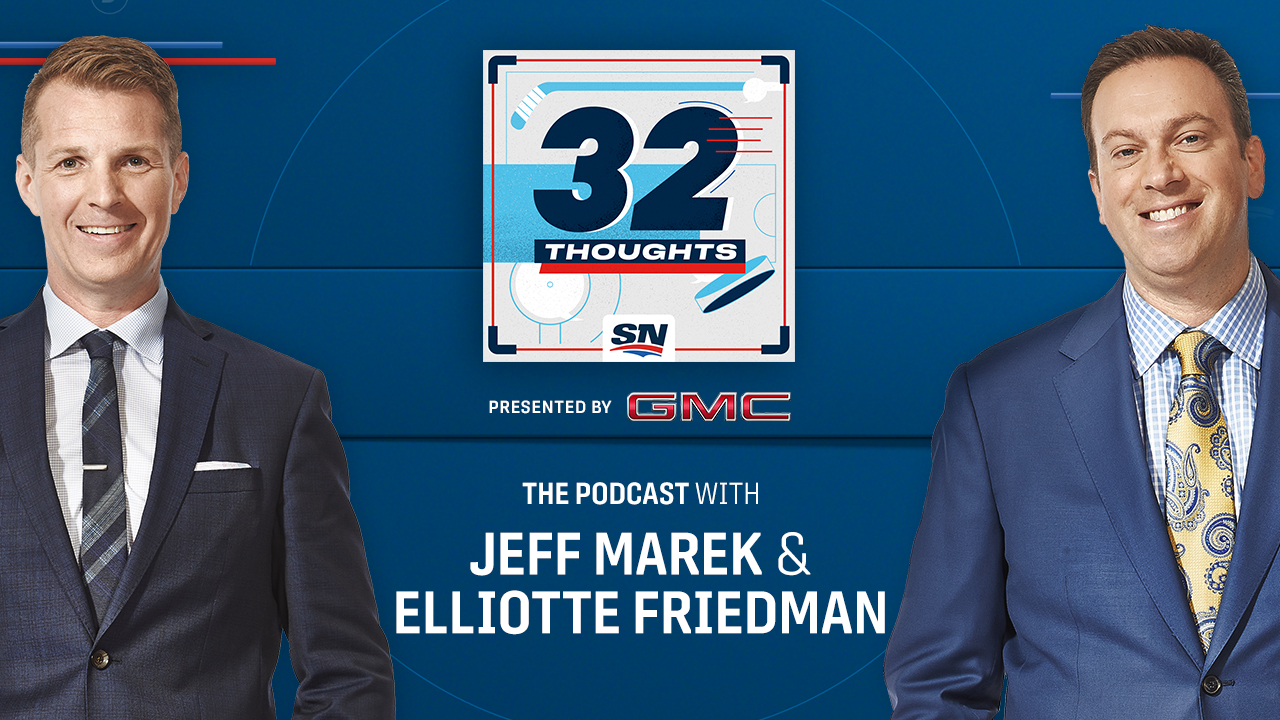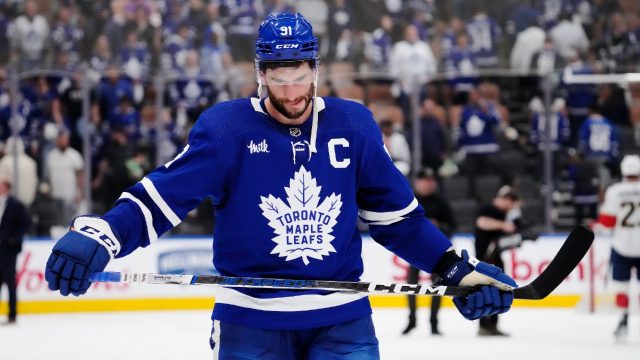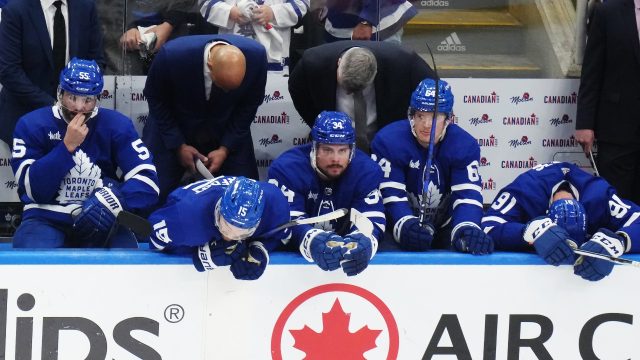
When skimming through TikTok videos, my For You algorithm will often pull in the same prank. It will show the operator of the thrill ride Mountain Monster — a drop ride in Tennessee — pretending to forget about an important safety measure like putting on a shoulder strap, and when the distracted passengers suddenly become concerned about that as they hang over the edge, he sends the ride down.
The startled riders scream in surprise. They were all expecting a drop of course, but were not at all prepared when it happened.
As we await what decisions are ahead for the Toronto Maple Leafs, the entirety of Leafs Nation is hanging on the Mountain Monster. They know — or certainly expect — the bottom is about to fall out of the team as it currently stands, but there’s no way anyone is prepared for the potential enormity of it.
No Leafs fan will accept running it all back again and everything could be on the table for the organization this summer, from the top on down. Since the Shanaplan hasn’t delivered post-season results yet, Brendan Shanahan’s job could be on the line. GM Kyle Dubas doesn’t have a contract, so either he or the team could decide to move in another direction. Head coach Sheldon Keefe has had four failed cracks at this — a change in the front office would certainly spell his end, but even the current leaders may want to look elsewhere.
And then we get to the players, where the real intrigue begins. The Leafs have 10 pending UFAs this summer and one important RFA. The bottom of the forward unit — namely Zach Aston-Reese, David Kampf and Noel Acciari — will have to be sorted, but boy, there are some far bigger fish to fry here.
We are not thinking this is about to turn into a rebuild, and what the trade market offers will most certainly influence how the Leafs act. They’ll want to keep seeking out playoff wins with some version of this group, but have to start trying to achieve it differently.
So as we head into what could (should?) be the most critical Leafs summer in some time — and maybe ever — we need to grasp what the most important contract situations are. Much of this revolves around the Core Four, though a few others could be vital in forming a new core to proceed with from this new low point.
Whatever direction the Leafs go in, it will certainly take shape over the next seven weeks. Management and coaching decisions may have to happen quickly, but for player moves, the June 28-29 draft and the lead-up to it is the window where all the action could happen.
Here are the seven most important contract situations to consider for the Leafs, and what could unfold in the next seven weeks.
AUSTON MATTHEWS
Years left on contract: 1
Note: Full no-move clause kicks in on July 1
This is the situation to watch in Toronto and it will get resolved one way or another over the next seven weeks.
Everything revolves around this situation. Matthews has one year left on his contract and is eligible to sign an extension as of July 1. Back in October we played with the numbers a little and projected what Matthews could command on his next contract. There is little doubt he will become the highest-paid NHL player (by AAV) whenever (or wherever) he does sign, it’s just a question of how much he goes above Nathan MacKinnon’s $12.6 million.
The cap is still projected to rise by just a million dollars for next season, and that upper limit is what Matthews would be negotiating against on July 1. But, potentially complicating matters, the post-pandemic cap is projected to start shooting up by multi-millions of dollars in 2024-25, when his extension would officially kick in. So will Matthews just barely become the highest-paid player over MacKinnon, or will he seek to maximize his earnings against the next big cap jump? That could be a difference of a couple million bucks. And there’s an argument to be made for him to chase being the first 20 per cent AAV player. What is his priority going to be?
Where it gets interesting is that Matthews goes from having no trade protection at all to having a full no-movement clause on July 1, the first day he’s eligible to sign an extension. It’s imperative for the Leafs to know before then that Matthews intends to stay, or else they’ll absolutely have to explore trade market options for him within the next seven weeks. It’s untenable to have an unsigned, untradeable Matthews on the roster on July 1, with the risk he could play out the final year of his contract and walk for nothing.
If Matthews stays, you know you have your big, MVP-calibre, first-line centre still there to keep pushing forward with. If there’s any doubt about his long-term future with the team, every bit of off-season change to the Leafs will revolve around how they navigate to a post-Auston Matthews reality.
WILLIAM NYLANDER
Years left on contract: 1
Note: 10-team no-trade clause kicks in on July 1
A goal scorer in both of Toronto’s last two games — including Game 5’s tying marker — there’s an argument to be made that Nylander was the best of Toronto’s Core Four in these playoffs. He may also be the one they have to trade.
Nylander brings the best value contract of the core players, counting for just $6.962 million against the cap, and he still has a year to go on it. But it’s also fair to wonder what he may want to chase on a new deal — after playing with such value compared to the real big-money forwards on the Leafs, will he be after the bag this time?
If so, that’s probably not going to work in Toronto and they may have to make a quick decision on what to do with Nylander as well. He doesn’t have any trade protections in his contract right now, but will be able to say “no” to a list of 10 teams as of July 1 — the same day he can sign an extension. It’s not as restrictive as Matthews’ full no-move clause so this isn’t as hard of a deadline to make a decision under. That said, if you’re trading a core player, it’d be wise to be able to negotiate with the entire league.
MITCH MARNER
Years left on contract: 2
Note: Full no-move clause kicks in on July 1
The extra year on Marner’s contract means Toronto isn’t risking walking him to free agency in a year like they could with Matthews and Nylander, but they’re still in a spot where they’ll have to decide whether to move forward with one of the highest-paid wingers in the league, or if he’s a single player luxury they can no longer afford.
Like Matthews, Marner goes from not having any trade protection at all to having a full no-move clause on July 1. If he’s on this team on that date, Marner is going to still be part of the plans for the future.
But should he be? Since signing his $10.9 million AAV in 2018 he’s been one of the highest-paid wingers in the league, and he attained that on just his second NHL contract. He has delivered in regular season points and two-way reliability, but that’s a ton of moolah to spend on one winger for a team that just isn’t getting the results it needs.
While teams would surely have interest in acquiring either Matthews or Nylander in a trade, they’d only get the assurance that either one would be on their roster for a single season. In Marner, an acquiring team would be comfortable knowing he’d be available to them for two seasons, which could make a world of difference in what the Leafs could get in return. This could be the trade that brings about considerable, and meaningful, change.
JOHN TAVARES
Years left on contract: 2
Note: Has a full no-move clause
We’re noting Tavares here because he is one of the ‘Core Four’ and, like Matthews, Tavares struggled to produce against the Panthers in the second round (no goals, one assist). So there’s bound to be fan frustration around this $11 million player.
But there’s almost no chance anything happens to Tavares this summer. Of the group, he might be the most likely to return.
There are plenty of reasons for that. One, is that he already has a full no-move clause, which has been in place since he signed with Toronto as a UFA in 2018. It’d be hard to see him trading in his Blue and White pajamas to move to another city now. Two, is that he’ll be 33 years old in September and $11 million is a lot for a player who might be getting beyond his best before date. Because of age and contract value, Tavares would be the toughest to move if all else was equal. But his no-move clause puts him in control here and it’s hard to fathom the captain giving a green light to a move.
ILYA SAMSONOV
Years left on contract: 0
Note: RFA this summer
Samsonov was an RFA last summer too, but the Washington Capitals gave up on him, didn’t send him a qualifying offer, and so he signed in Toronto as a UFA on a one-year show-me deal to re-establish his value.
Mission accomplished.
Samsonov was one of the good stories overall for Toronto this year, posting a .919 save percentage and 2.33 GAA in 42 regular season games. He was largely good enough in the playoffs too, certainly not to blame for the disappointing finish, and so it would seem wise to keep him around.
He is again an arbitration-eligible RFA this summer, due a $1.8 million qualifying offer the Leafs are likely to give him. But Samsonov may very well want a pay increase, so then the question becomes: what’s his number to avoid arbitration? Some recent UFA goalies who projected to be their team’s No. 1 have signed in the $5 million AAV range, but Samsonov won’t have that type of leverage.
Joseph Woll just had a pretty good playoff showing, too, and that followed a promising seven-game sample in the regular season. He’s going to have to be part of whatever the plan is in net from here, but his inexperience means the Leafs will want to have someone a little more established to at least create a tandem with.
Meantime, Matt Murray still has one year left on his $4.687 million contract and buying him out would only tighten the cap picture further. They may have to expend an asset in trade to dump him off.
RYAN O’REILLY
Years left on contract: 0
Note: UFA this summer
Finishing up a contract that paid him $7.5 million against the cap in St. Louis, O’Reilly counted for only $1.875 million against Toronto’s cap after they acquired him and had two other teams retain a portion of his salary. And he was a largely successful pickup, a local guy, and someone you’d probably want to keep in the room as a leader into whatever this next phase is going to be.
But he won’t come in below $2 million anymore. O’Reilly is no longer a $7.5 million player and he may even consider taking something of a paycut to remain in Toronto, but it won’t be at the same discount. Again — what’s his number?
If it so happens that Matthews is not back next season, and a starting centre isn’t returned in a potential trade, keeping O’Reilly suddenly would become that much more important. And even if Matthews does re-sign, if the belief is that Tavares should start moving towards being a winger, again you’d want O’Reilly there for the centre depth, and to ensure you have a quality pivot behind Matthews. It’s the most important position on the ice besides goaltender, so whatever the Leafs are planning here, they cannot leave themselves short down the middle.
MICHAEL BUNTING
Years left on contract: 0
Note: UFA this summer
Kyle Dubas took a no-risk shot on Bunting as a UFA in 2021, signing him to a two-year contract that paid $950,000 against the cap. He arrived in Toronto with just 26 NHL games under his belt, but with the upside promise of a player who had really strong point-per-minute rates in his small Arizona sample size. He certainly delivered on that promise, too, with back-to-back 23-goal seasons and carving out a place alongside Toronto’s top-line scorers.
But he did take a 14-point dip this season, and then there was the matter of the three-game suspension in Round 1 against Tampa Bay on an unnecessary head shot against Erik Cernak. Bunting plays on the edge and sometimes that can lead to good things. It’s when the reputation takes a turn and he starts hurting his team more than he helps it that it becomes a problem.
According to Natural Stat Trick, Bunting drew one more penalty than he took this season. Last season he drew 13 more penalties than he took. He’s beginning to grow a reputation as something of an embellisher and refs are catching on.
There is a toughness/sandpaper element to his game that the Leafs won’t want to lose too much of this summer (Kampf, Acciari and Aston-Reese are all UFAs, too), so they will have to make their choices wisely. Bunting would figure to be the most expensive of that bunch, but is also the one who can effectively play and produce in the top-six. He won’t be such a value anymore, though, and so if you think he’s becoming too much of a liability to invest a few million of cap space in, he walks.
The plan there could be to simply replace him up top with Matthew Knies, who showed well in the playoffs, and find cheaper, more traditional “grinders” to contribute in the bottom-six (via trade or otherwise). The free agent market isn’t tremendous this summer, though, so it won’t be so easy to find the ‘next’ Michael Bunting.








